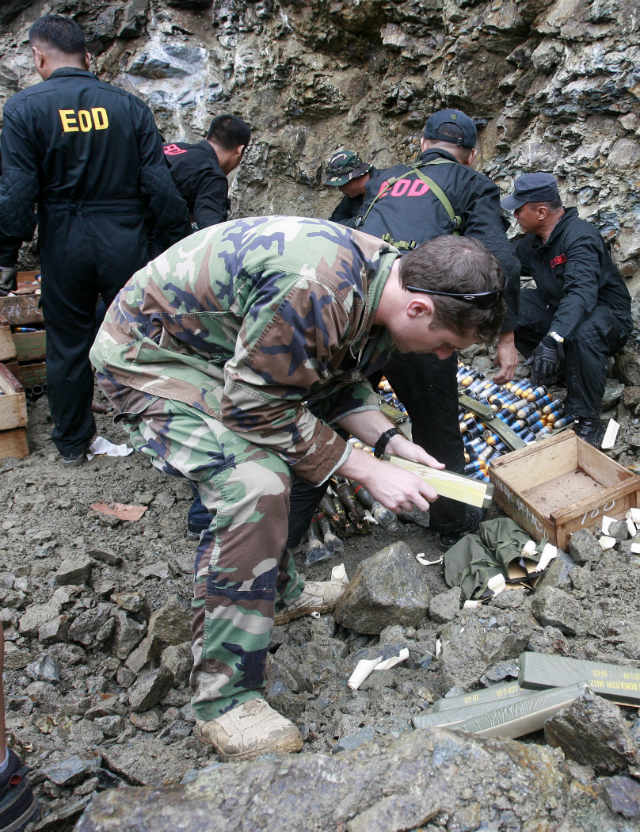Defense Secretary Voltaire Gazmin says the group of 500 to 600 American servicemen was cut back to 200 starting this year

ANTI-TERROR TEAM.
An Explosives Ordinance and Disposal personnel from US Joint Special Operations
Task Force-Philippines (JSOTF-P) prepares pounds of C-4 explosives to detonate
more than a ton of defaced and defective assorted rounds of ammunition in a mining
site in the mountains of Sirawai town, Zamboanga del Norte province, southern Philippines
The
In a statement,
US Embassy spokesman Kurt Hoyer confirmed that the US Joint Special Operations
Task Force-Philippines (JSOTF-P) “will no longer exist” after a transition plan
is set.
Hoyer said the
“success” of JSOTF-P has led the Special Operations Command, Pacific and
JSOTF-P planners, “in coordination with our Philippine partners, to begin
working on a transition plan where the JSOTF-P as a task force will no longer
exist, but many of the capabilities will remain” under the Pacific Command
Augmentation Team.
Hoyer explained:
“Our partnership with the Philippine Security Forces has been successful in
drastically reducing the capabilities of domestic and trans-national terrorist
groups in the Philippines
The US
'Reducing
their numbers'
In an interview
with reporters, Defense Secretary Voltaire Gazmin said the group of 500
to 600 American servicemen rotating through the strife-torn southern Philippines
“They were never
permanent. They just teach, they train our people, and they are satisfied with
what we have learned so they are reducing their numbers,” he said.
Gazmin said the
work of Filipino troops had improved sharply since their US
Gazmin also said
that American training and loans of US
This includes the
bombing of a ferry in Manila
Abu Sayyaf's
'serious setbacks'
Founded in the
1990s with seed money from Osama bin Laden's Al-Qaeda network, the Abu Sayyaf
has survived over the past decade by drawing support from poor Muslim
communities that have become a fertile recruiting ground.
But it has
suffered serious setbacks in recent weeks, including the arrest of one of its
top leaders Khair Mundos, listed by the US
The cutback of US
troops in the southern Philippines comes after Washington and Manila signed a
new defense agreement in April, allowing American forces greater access to
bases in its former colony. (READ: Senators
pinpoint 7 flaws in EDCA)
The defense pact
also comes as the Philippines
seeks more US help in
dealing with territorial disputes with an increasingly assertive China
http://www.rappler.com/nation/61725-us-disband-philippine-anti-terror-team

No comments:
Post a Comment
Note: Only a member of this blog may post a comment.